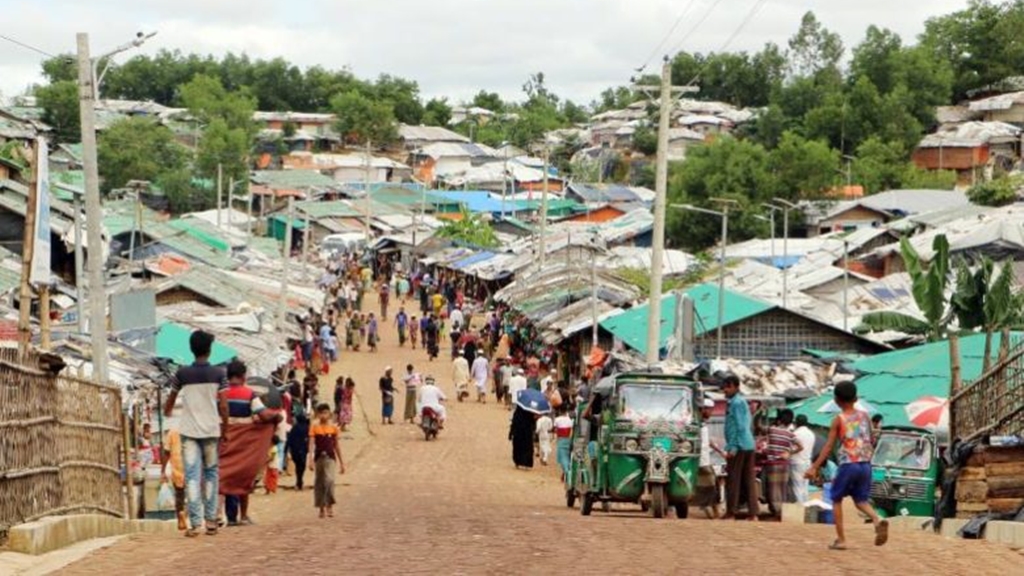Children are Victims in Arakan State, Unicef Says
- 09/10/2013
- 0
An ethnic Rohingya boy and woman eat at a camp
for displaced Muslim families in Arakan State. (Photo: JPaing / The Irrawaddy)
for displaced Muslim families in Arakan State. (Photo: JPaing / The Irrawaddy)
By Nyein Nyein
October 8, 2013
RANGOON — The UN agency for children’s rights
has called for an end to communal violence in west Burma, where clashes last
week between Muslims and Buddhists left hundreds of people homeless.
has called for an end to communal violence in west Burma, where clashes last
week between Muslims and Buddhists left hundreds of people homeless.
Unicef issued a statement on Tuesday urging an
end to violence in Arakan State, following the third major wave of communal
violence to hit the state since last year. The clashes last week near the
southern town of Thandwe left five people dead and destroyed some 110 homes.
end to violence in Arakan State, following the third major wave of communal
violence to hit the state since last year. The clashes last week near the
southern town of Thandwe left five people dead and destroyed some 110 homes.
In the two waves of unrest last year—elsewhere
in Arakan State, in June and October—more than 140,000 people were displaced,
and more than 105,000 were children affected by the violence, according to
statistics from Unicef, which is providing aid locally.
in Arakan State, in June and October—more than 140,000 people were displaced,
and more than 105,000 were children affected by the violence, according to
statistics from Unicef, which is providing aid locally.
“We are concerned the inter-communal violence
is spreading in the whole country,” Bertrand Bainvel, a Unicef spokesman in
Rangoon, told The Irrawaddy. Anti-Muslim riots have also broken out in several
locations across Burma this year.
is spreading in the whole country,” Bertrand Bainvel, a Unicef spokesman in
Rangoon, told The Irrawaddy. Anti-Muslim riots have also broken out in several
locations across Burma this year.
Bainvel said the violence could affect the
country’s ability to promote peace and stay united in the long term, amid a
transition to democracy after decades of military rule. Of the unrest, he said,
“first and foremost, if affects children.”
country’s ability to promote peace and stay united in the long term, amid a
transition to democracy after decades of military rule. Of the unrest, he said,
“first and foremost, if affects children.”
“It is difficult for them to understand what is
going on. It is psychologically very difficult.”
going on. It is psychologically very difficult.”
Unicef, which has provided assistance in Arakan
State for education, nutrition and health, as well as psychosocial support,
says the unrest has made it nearly impossible for many affected children to
continue their education or access health care. “Even if they manage to go to
school, it is difficult for them to concentrate on learning because they will
hear about the burning, shooting or adults speaking about violence,” the Unicef
spokesman said. “Even if their houses weren’t burned, maybe their neighbors’
homes were.”
State for education, nutrition and health, as well as psychosocial support,
says the unrest has made it nearly impossible for many affected children to
continue their education or access health care. “Even if they manage to go to
school, it is difficult for them to concentrate on learning because they will
hear about the burning, shooting or adults speaking about violence,” the Unicef
spokesman said. “Even if their houses weren’t burned, maybe their neighbors’
homes were.”
In temporary camps for displaced families near
Sittwe, the state capital, about 85,000 children are 18 years old or younger.
These include both Muslims and ethnic Arakanese Buddhists.
Sittwe, the state capital, about 85,000 children are 18 years old or younger.
These include both Muslims and ethnic Arakanese Buddhists.
Unicef operates a temporary learning center for
displaced children in camps in Sittwe as well as nearby Myaybon, Pauktaw and
Kyauktaw townships, but only 7,500 children aged 11 to 14 have access to it.
Unicef says another 1,000 children will soon be able to attend.
displaced children in camps in Sittwe as well as nearby Myaybon, Pauktaw and
Kyauktaw townships, but only 7,500 children aged 11 to 14 have access to it.
Unicef says another 1,000 children will soon be able to attend.
Farther north in Kachin State, where clashes
continue between ethnic rebel armed groups and the government army, 8,000
children between the ages of 6 and 9 attend schools in rebel-controlled
territory. Unicef does not have other data on the number of children affected
by conflicts elsewhere in the country due to government restrictions on
traveling to those areas.
continue between ethnic rebel armed groups and the government army, 8,000
children between the ages of 6 and 9 attend schools in rebel-controlled
territory. Unicef does not have other data on the number of children affected
by conflicts elsewhere in the country due to government restrictions on
traveling to those areas.







